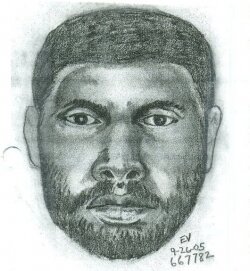DNA advance: Harrington's parents pleased by familial approval
-
 Along with this composite sketch of the assailant in a 2005 Fairfax rape, connected by DNA to the Morgan Harrington case, investigators now have another tool at their disposal: familial DNA searching.File photo
Along with this composite sketch of the assailant in a 2005 Fairfax rape, connected by DNA to the Morgan Harrington case, investigators now have another tool at their disposal: familial DNA searching.File photo -
 Morgan Harrington, who should have graduated from Virginia Tech in May, will receive a diploma posthumously, says her father Dan Harrington, who hopes to walk in her place during graduation exercises.PHOTO COURTESY HARRINGTON FAMILY
Morgan Harrington, who should have graduated from Virginia Tech in May, will receive a diploma posthumously, says her father Dan Harrington, who hopes to walk in her place during graduation exercises.PHOTO COURTESY HARRINGTON FAMILY
Four months after the parents of murdered Virginia Tech student Morgan Harrington urged the Virginia Crime Commission to allow familial DNA searches to be conducted in unsolved homicides, the state is ready to begin using the tool, Governor Bob McDonnell announced Monday, March 21.
"I think this is going to be very valuable," says Morgan's father, Dan Harrington, "not only in Morgan's case, but in other unsolved crimes throughout the state."
The Harrington case certainly seems tailor-made for the technology. Twenty-year-old Harrington disappeared from outside UVA's John Paul Jones Arena during a Metallica concert on October 17, 2009. Her remains were discovered more than three months later on an Albemarle County farm, and unidentified DNA recovered in the case matches DNA left on the victim of a 2005 rape in Fairfax.
Unlike a traditional DNA search, which looks for an exact match within the state's DNA databank, a familial DNA search looks for matches that suggest an immediate family relationship to help police home in on a suspect. It's how California investigators recently caught two alleged predators. Lonnie David Franklin Jr., known as the Grim Sleeper, is an alleged serial killer charged with slaying at least 10 women over 25 years. His arrest last summer came after investigators linked him to a DNA sample from his son– a felon whose DNA was in California's databank. Earlier this month, California investigators had another familial DNA success with the arrest of a long-sought suspect in a 2008 robbery and sexual assault.
With McDonnell's announcement, Virginia becomes the third state to embrace familial searches, joining Colorado and California. Following the recent arrest of Aaron H. Thomas, the man believed to be the East Coast Rapist, Prince William Commonwealth's Attorney Paul Ebert echoed the Harringtons' plea for wider use of the technology.
"If it had been available, this case would have been solved in '07," said Ebert, adding that several females, including three teenage girls Thomas allegedly abducted and raped in 2009 in Prince William, might have been spared.
The new guidelines for familial DNA searching issued by the Virginia Department of Forensic Science address privacy concerns raised by groups including the ACLU, and suggest that the tool will be used only in the most serious unsolved crimes in which there is an unidentified DNA sample believed to belong to the perpetrator.
According to the guidelines, the lead investigating agency must request the search, and the Commonwealth's Attorney for the jurisdiction in which the crime occurred must confirm that use of the search would be appropriate.
So will the Harrington case be Virginia's first familial DNA search? It seems likely, even as various enforcement personnel remain vague in their responses.
Virginia State Police spokesperson Corinne Geller says that the Department of Forensic Science is "aware of our interest," while the Department's Pete Marone says only, "We are progressing."
The first step in a familial search is running a profile through the computerized databank, which could produce as many as 100 possible matches, Marone explains. The time-consuming and labor-intensive piece comes next, as scientists conduct additional tests on each sample to further narrow the list. Marone says each search will likely cost about $6,000, and he believes the department can conduct about one such search per month without additional staff.
While the development is good news to the Harringtons and others who have pushed for the technology's acceptance, Marone says the public won't likely hear if there is a match until after an arrest occurs– and he cautions that there are no guarantees that the search will turn up any leads.
"It's a longshot," he says, "but when you don't have any other shots left, it looks pretty good."